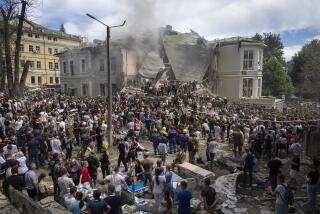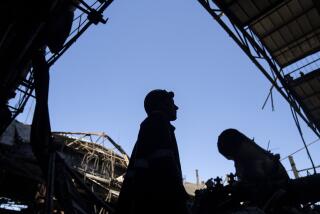The Ukraine Nuclear Disaster
- Share via
Not much is known yet about the accident at a Soviet nuclear power station in the Ukraine, but already it is obvious that it was an appalling disaster--the worst in the history of nuclear power. The United States and other Western governments should respond unstintingly to any requests from the Soviet government for humanitarian and technical help to cope with the tragedy. But we also have a right to insist that the Soviets recognize their responsibility to the world community.
The accident, at the Chernobyl nuclear power plant 60 miles north of Kiev, apparently involved a graphite fire resulting from the meltdown of the reactor core. Officially the Soviets admit to only a handful of deaths, but foreign experts fear that the accident’s ultimate toll may be counted in the thousands.
Radioactivity far above normal levels has been reported in Poland and the Scandinavian countries. Radioactive fallout may reach the western coast of the United States within a few days. Experts say there is no danger to public health, but state and federal authorities have a responsibility to monitor the situation closely to be sure this is the case.
Kiev, a city of more than 2 million people, faces the danger of radioactive contamination of its water supply. The Hungarians, who receive power from the Chernobyl complex, will be affected. But the disaster is also bound to have an impact on the Soviet economy as a whole.
The Russians currently rely upon nuclear plants for about 11% of their electric power output and have planned to double nuclear power generation by 1990. Many of the new plants are scheduled for construction in heavily populated areas of European Russia. Surely these plans must now be reviewed. Alarm over the accident is likely to have an impact, too, on nuclear power development in Western Europe, the United States and the Third World.
Certain conclusions already can be drawn from the Soviet disaster.
One is reaffirmation that nuclear power generation, like nuclear weapons testing, is not purely the business of the nation where the activity takes place. The world community is affected, and thus has a right to demand minimum safety standards. Those standards clearly have not been met in the Soviet Union, where most nuclear reactors--apparently including the ill-fated plant at Chernobyl, do not have containment structures of the sort that are almost universal outside Russia.
The International Atomic Energy Agency conducts inspections--imperfect, but helpful--aimed at preventing the spread of nuclear weapons. But there is no provision for international safety inspection. There should be.
Another lesson is that, despite all the talk about a more open Soviet press, the Russians did not admit that a nuclear accident had occurred until Swedish complaints forced the issue. The Soviet Union’s neighbors, in particular, have a right to demand a formal agreement under which the Russians, along with everybody else, would be obliged to provide full and timely details when a disaster occurs that could threaten the health and public safety of other nations.
More to Read
Sign up for Essential California
The most important California stories and recommendations in your inbox every morning.
You may occasionally receive promotional content from the Los Angeles Times.













